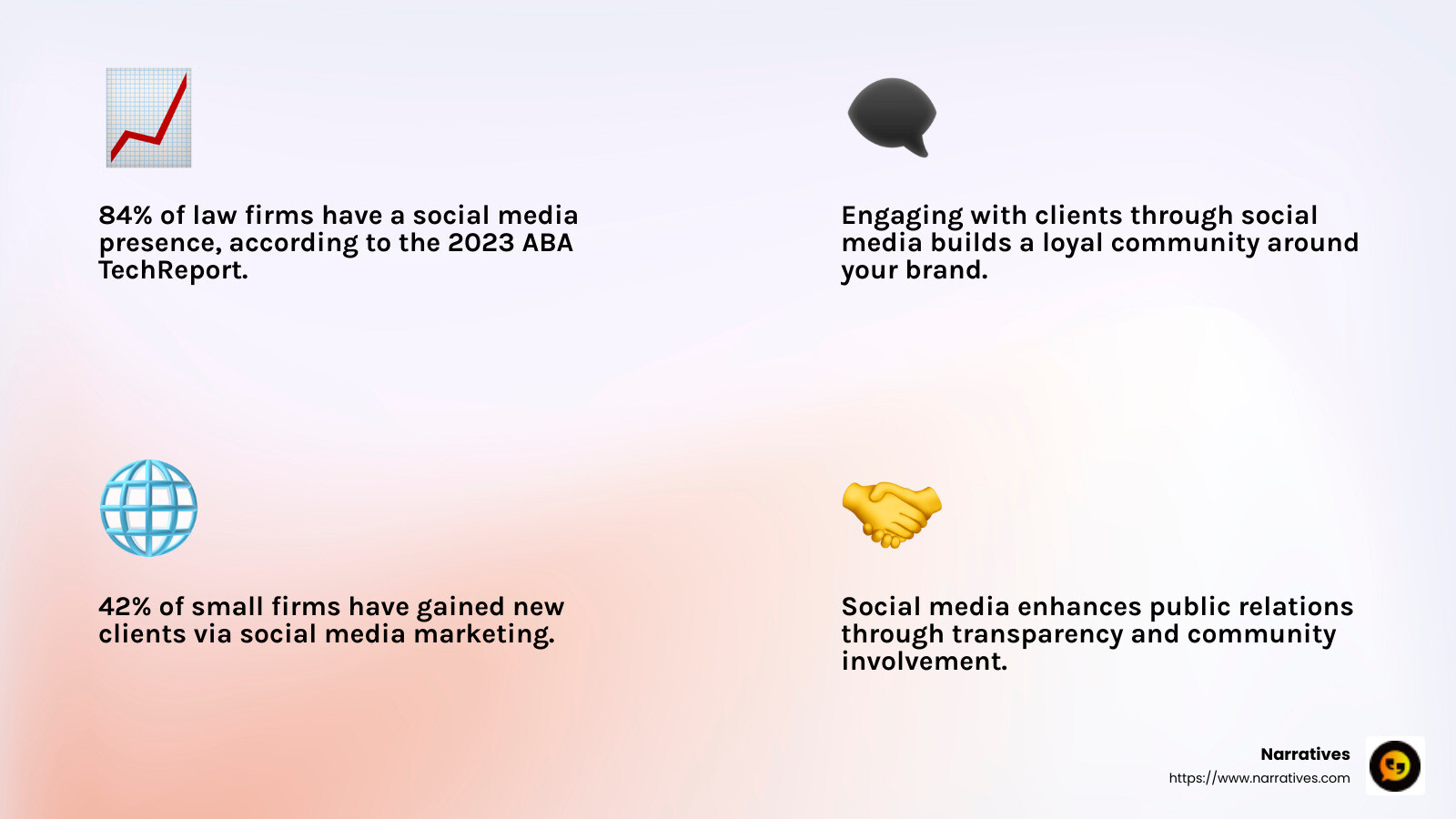Justice Served: A Guide to Social Media Marketing for Lawyers

Social media marketing for lawyers is a powerful tool to transform how legal professionals connect with audiences. By engaging effectively on social media, lawyers can improve communication, broaden their reach, and attract new clients.
Here’s why it's important:
- Expand Your Reach: Social media offers access to potential clients and professional circles you might otherwise miss.
- Build Trust and Expertise: Share content that showcases your expertise and build a credible online presence.
- Stay Competitive: Most law firms are online; missing out means falling behind.
In our digital age, robust communication skills extend beyond courtrooms and meeting rooms. Lawyers need to be where their clients are—online.

Social media marketing for lawyers terms simplified:
- social media marketing for b2b companies
- social media management strategy
- social media recruitment strategy
Why Social Media Marketing for Lawyers?
In today's interconnected world, social media marketing for lawyers is not just an option; it's a necessity. Let's explore why:
Build Brand Awareness
Social media platforms like Facebook and LinkedIn are powerful tools for building brand awareness. By maintaining an active presence, law firms can showcase their values, expertise, and successes to a broad audience. According to the 2023 ABA TechReport, 84% of law firms already have a social media presence. This statistic highlights the importance of social media in staying relevant and visible in the legal industry.
Engage with Clients
Social media is more than just a broadcasting tool; it's a platform for interaction. Engaging with clients through comments, shares, and direct messages helps build a community around your brand. This engagement fosters trust and loyalty, as clients feel heard and valued. Lawyers can use social media to discuss trending legal issues, share insights, and even participate in live Q&A sessions to address common legal concerns.
Attract New Clients
The ultimate goal of social media marketing for lawyers is to attract new clients. Social media provides a pathway for potential clients to find your firm. For instance, sharing a blog post about legal tips on Facebook can lead prospective clients to your website, where they can learn more about your services and reach out for consultations. As reported by the ABA, 42% of small firms have gained new clients through social media marketing efforts.
Improve Public Relations
Social media also serves as a tool for public relations. By sharing success stories, community involvement, and client testimonials (with permission), law firms can shape their public image positively. This transparency and authenticity can differentiate your firm from competitors and make it more appealing to potential clients.

In conclusion, social media marketing for lawyers is a critical strategy for building brand awareness, engaging with clients, and attracting new business. By leveraging these platforms effectively, law firms can achieve significant growth and maintain a competitive edge in the legal industry.
Best Practices for Social Media Marketing
To succeed in social media marketing for lawyers, it's crucial to follow best practices that maximize your reach and impact. Let's explore some key strategies:
Consistency is Key
Consistency builds trust. Regular posting keeps your firm on clients' minds and shows professionalism. A content calendar can help plan and organize posts, ensuring a steady flow of content without last-minute scrambles. This approach also leaves room to review ethical guidelines before hitting "publish."
Plan Your Content
Effective content planning is about quality over quantity. Mix educational posts, such as legal tips or myth-busting facts, with engaging content like behind-the-scenes looks at your firm. For instance, share a "Day in the Life" video of a lawyer at your firm to humanize your practice. This variety keeps your audience engaged and interested.
Content Ideas:
- Legal Tips: Offer practical advice, like "What to Do After an Accident."
- Team Spotlights: Introduce team members and share their stories.
- Community Involvement: Highlight your firm's participation in local events.
Engage Actively
Engagement on social media is not just about posting; it's about interacting. Respond to comments, join discussions, and share valuable insights. This two-way communication fosters a sense of community and builds stronger relationships with your audience.
Tips for Engagement:
- Respond Promptly: Acknowledge comments and messages quickly.
- Join Conversations: Participate in relevant discussions, especially in legal forums or groups.
- Collaborate with Influencers: Partner with industry experts for webinars or joint content to expand your reach.

By focusing on these best practices, law firms can improve their social media presence, build stronger client relationships, and ultimately grow their practice. Next, we'll explore the top social media platforms that are most effective for lawyers.
Top Social Media Platforms for Lawyers
When it comes to social media marketing for lawyers, choosing the right platforms can make all the difference. Each platform offers unique benefits that cater to different aspects of legal marketing. Let’s break down the top choices:
Facebook is a powerhouse with over 2.5 billion active users. For lawyers, it’s a great place to connect with potential clients and share educational content.
Benefits:
- Community Engagement: Join or create Facebook groups to connect with your target audience.
- Live Videos: Use Facebook Live to host Q&A sessions or webinars on legal topics.
- Ads and Chatbots: Run targeted ads and use Messenger chatbots to engage with potential clients.
LinkedIn stands out as the most popular platform for lawyers, with 69.2% of law firms maintaining a presence there. It’s designed for business networking and professional growth.
Benefits:
- Professional Networking: Connect with peers and potential clients in the legal industry.
- Thought Leadership: Share articles and insights to establish authority in your field.
- Firm Pages: Create a LinkedIn page for your firm to showcase services and achievements.
YouTube
YouTube provides a platform for sharing video content, which can humanize your firm and build trust with potential clients.
Benefits:
- Video Content: Share educational videos that provide legal tips or explain complex legal issues.
- Subscriber Engagement: Build a subscriber base that regularly engages with your content.
- Visual Storytelling: Use videos to tell your firm’s story and highlight successful case studies.
TikTok
TikTok may seem unconventional for lawyers, but it offers a way to reach a younger audience with creative, short-form video content.
Benefits:
- Trend Participation: Engage with trending topics in a fun and informative way.
- Educational Snippets: Share quick legal tips or debunk myths in short videos.
- Viral Potential: Tap into TikTok’s algorithm to reach a wide audience quickly.
Instagram is ideal for showcasing the visual side of your law firm. It’s especially effective for firms in consumer-focused areas like personal injury.
Benefits:
- Visual Content: Share photos and videos that highlight your firm’s culture and community involvement.
- Storytelling: Use Instagram Stories to give a behind-the-scenes look at your firm.
- Engagement with Young Audiences: Connect with users aged 18-34, who make up a large part of Instagram’s user base.
By leveraging these platforms effectively, law firms can improve their visibility, connect with potential clients, and build a strong online presence. Next, we'll discuss how to create a comprehensive social media strategy custom for your law firm.
How to Create a Social Media Strategy
Creating an effective social media marketing strategy for lawyers involves three key steps: setting clear goals, understanding your audience, and planning your content.
Goal Setting
First, decide what you want to achieve with your social media efforts. Are you aiming to gain more clients, build brand awareness, or increase website visits? Your goals should be SMART: Specific, Measurable, Achievable, Relevant, and Time-bound.
- Specific: Clearly define your objectives. For example, "Increase consultation bookings by 20% in the next quarter."
- Measurable: Use metrics like engagement rates and follower growth to track progress.
- Achievable: Set realistic targets based on your resources and market size.
- Relevant: Align your goals with your firm's broader objectives, like expanding into new areas of practice.
- Time-bound: Establish deadlines to evaluate your success and adjust strategies as needed.
Audience Research
Understanding your audience is crucial for tailoring your content. Create a client persona—a fictional representation of your ideal client.
- Demographics: Consider age, location, and income level. For instance, a typical client might be a 40-year-old male facing legal issues in DuPage County.
- Interests and Needs: Identify what legal information your audience seeks. This helps in crafting content that resonates with them.
- Behavior: Know where your audience spends their time online. This ensures you're using the right platforms to reach them.
Engage with your audience by joining relevant discussions and responding to comments. This builds trust and positions your firm as an approachable resource.
Content Calendar
A content calendar is your roadmap for consistent posting. It helps you plan what to post and when, reducing last-minute stress and ensuring regular engagement.
- Pre-plan Content: Decide on topics like legal tips, client testimonials, or team spotlights. This aligns with what your audience finds valuable.
- Schedule Posts: Use tools like Hootsuite or Buffer to automate posting, freeing up time for other tasks.
- Review and Adjust: Regularly check your calendar to ensure it aligns with your goals and audience interests.
Creating a content calendar also allows time to review ethical guidelines, ensuring compliance and protecting client confidentiality.
By setting clear goals, understanding your audience, and planning your content, you can create a social media strategy that effectively supports your law firm's growth. Next, we'll tackle some frequently asked questions about social media marketing for lawyers.
Frequently Asked Questions about Social Media Marketing for Lawyers
How can lawyers ethically use social media?
Ethics and compliance are crucial when lawyers engage in social media marketing. Lawyers must adhere to guidelines set by their jurisdiction’s legal authority. Many states, for instance, restrict the use of terms like "expert" or "specialist" unless the lawyer is certified as such. Always check the rules before posting anything.
Confidentiality: Never share client information or case details. Even a casual mention can lead to ethical violations.
Honesty: Avoid exaggerating your skills or results. Misleading information can damage your reputation and lead to legal consequences.
Professionalism: Maintain a professional tone. Comments and posts should reflect the dignity of the legal profession.
Following these guidelines helps maintain trust and credibility with your audience.
What content should law firms post on social media?
Creating valuable content is key to engaging your audience. Here are some ideas:
Legal Tips: Share practical advice on common legal issues. For example, "5 Steps to Take After a Car Accident" can attract potential clients needing help.
Client Testimonials: Showcase positive feedback from clients. This builds trust and provides social proof of your firm's expertise.
Behind-the-Scenes: Humanize your practice by sharing office events or community service activities. This makes your firm relatable and approachable.
Educational Content: Dispel common legal myths. This positions your firm as a knowledgeable resource and can drive engagement.
How do law firms measure social media success?
To determine the effectiveness of your social media marketing, use analytics tools to track key performance indicators (KPIs).
Engagement Rates: Monitor likes, shares, and comments. High engagement often indicates that your content resonates with your audience.
Follower Growth: Track the increase in followers over time. Steady growth suggests that your content is attracting new viewers.
Website Traffic: Use tools like Google Analytics to see how much traffic social media is driving to your website. More visitors can lead to more consultations and clients.
Return on Investment (ROI): Calculate ROI by comparing the time and money spent on social media activities to the new clients and revenue generated. This helps in evaluating the cost-effectiveness of your efforts.
By adhering to ethical guidelines, posting engaging content, and measuring success through analytics, law firms can effectively harness the power of social media. Next, we'll explore how digital storytelling and partnerships can further improve your firm's online presence.
Conclusion
In the changing landscape of social media marketing for lawyers, one thing remains constant: the power of storytelling. At Narratives, we focus on elevating underrepresented voices through compelling digital storytelling. This approach not only resonates with audiences but also builds trust and inspires action.
Digital storytelling is not just about creating content; it's about crafting a narrative that connects emotionally with your audience. For law firms, this means sharing stories that highlight your expertise, showcase client successes, and demonstrate your impact in the community. By doing so, you humanize your practice and make it relatable to potential clients.
Partnering with non-profits can amplify your storytelling efforts. Non-profits often have powerful stories that align with the values of social justice and community service. Collaborating with them can improve your firm's visibility and credibility. These partnerships allow you to reach a broader audience and reinforce your commitment to social impact.
As we continue to explore the potential of social media for law firms, it's not just about visibility—it's about building meaningful connections. By leveraging the power of storytelling, you can transform your social media presence into a platform that not only attracts clients but also makes a difference.
For more insights into how Narratives can help your firm tell its story, learn more about our media services. Together, we can create content that resonates and inspires action.


